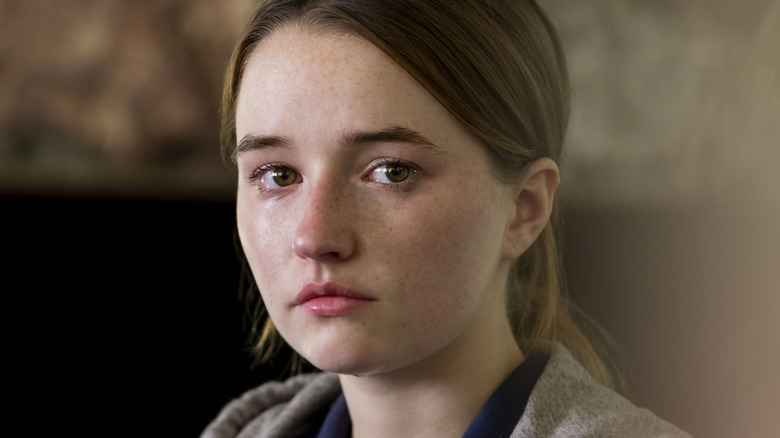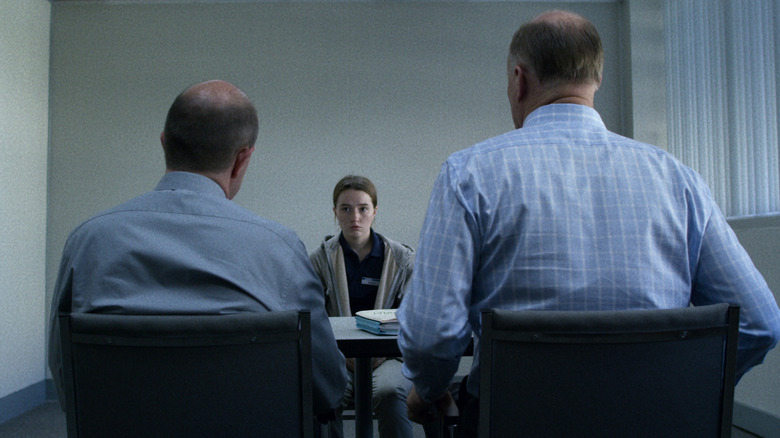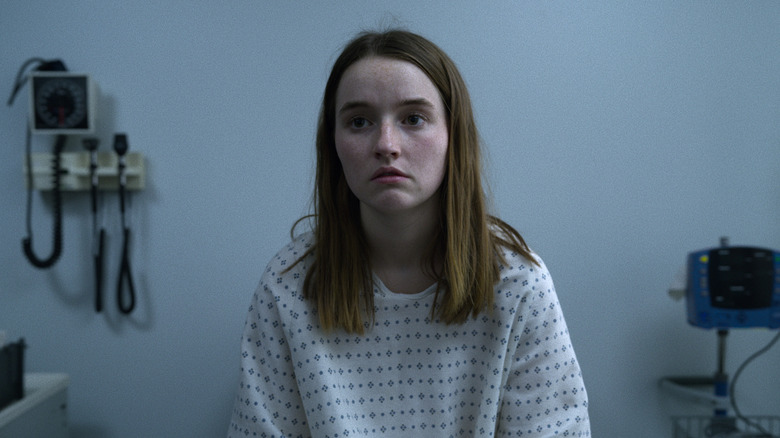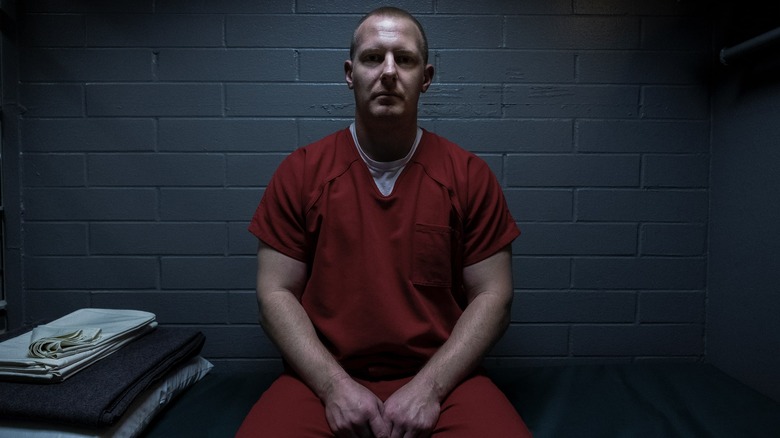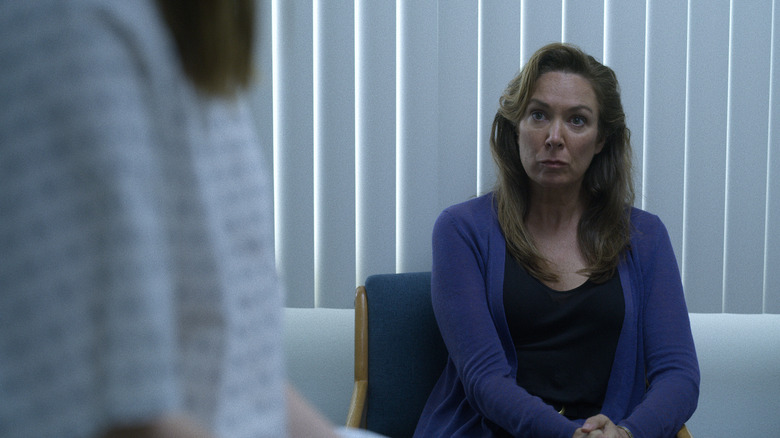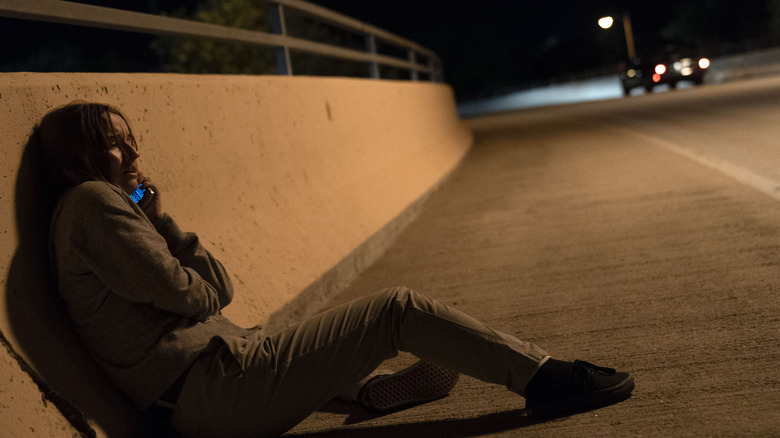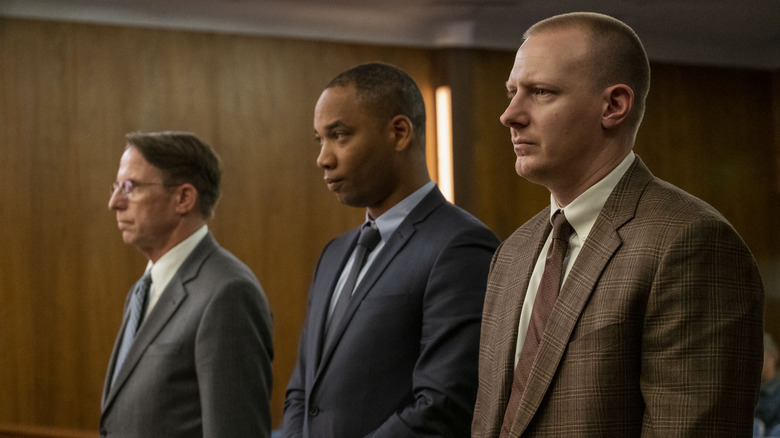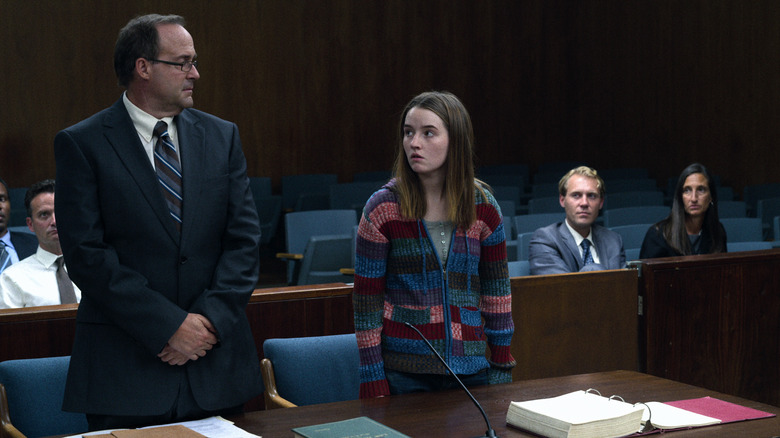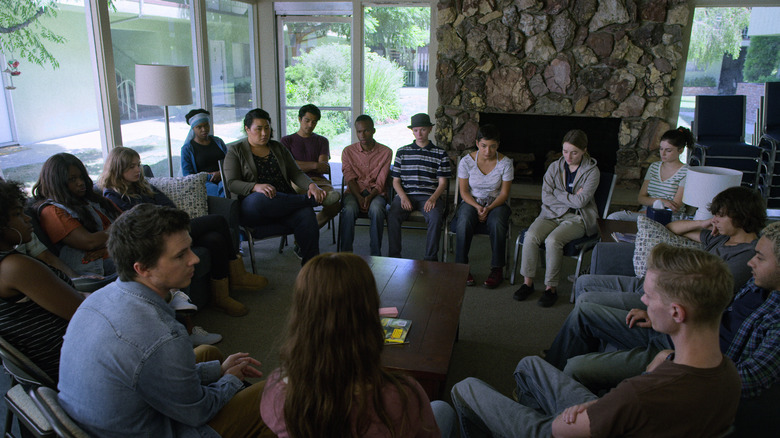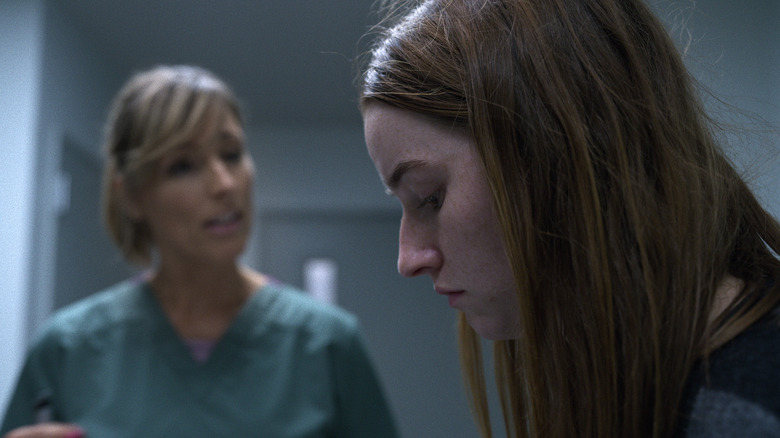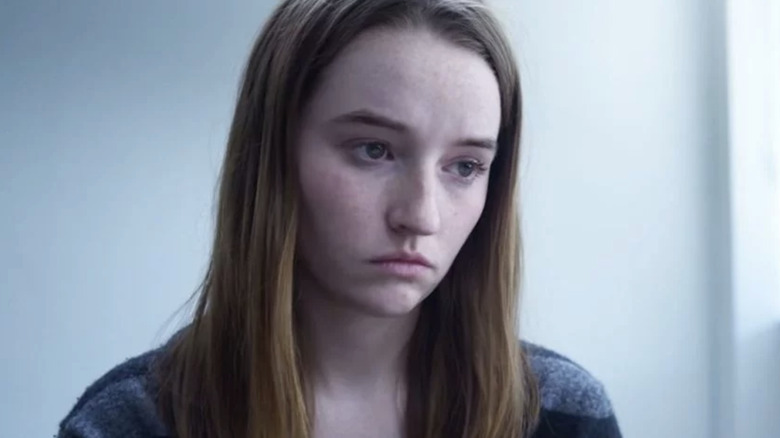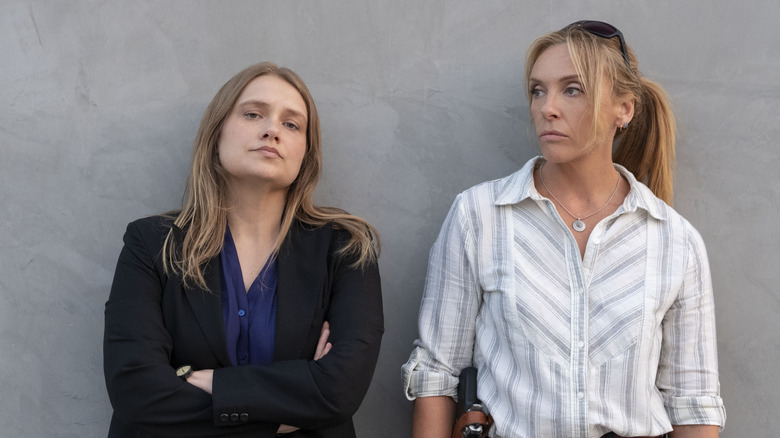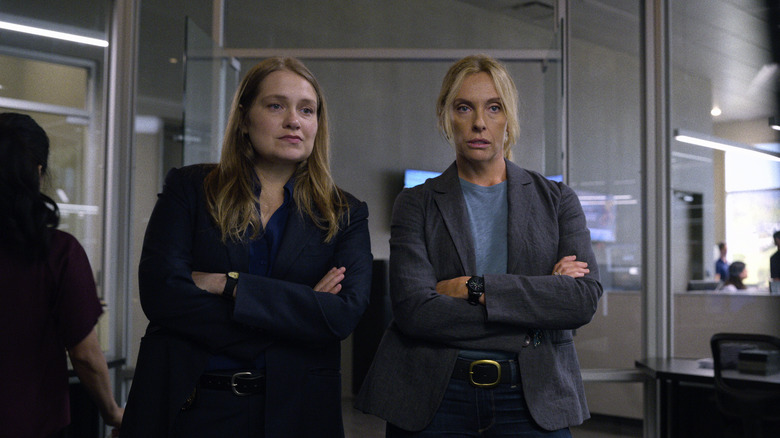Netflix's Unbelievable: The Truth Behind The Limited Series
We may receive a commission on purchases made from links.
Netflix's Unbelievable delivers one of the most poignant scenes in the limited series' third episode. In the scene, Marie (played by Kaitlyn Dever) sits next to a roaring ocean in the dark of night with her friend Connor. In the days leading up to this moment, Marie has been blacklisted by her tight-knit community of former foster home teens for reporting — and then recanting — a detailed account of being raped in her apartment. In an attempt to comfort her, Connor assures Marie that what she's going through will "get smaller [and] stop mattering." He adds, "Like, this stuff, I promise one day, pretty soon really, no one will remember any of it."
Fortunately, as later revealed in the series, Connor's promise never came to fruition. Marie's story didn't get smaller, and it never stopped mattering. In fact, the story of what happened to the real Marie is bigger than ever before, thanks, in part, to Netflix shining an even brighter spotlight on her chilling 2008 account and the events that transpired in the years that followed. Here's the true story behind Netflix's Unbelievable.
Netflix's Unbelievable is based on a Pulitzer prize-winning article
In a September 2019 interview with Metro, Netflix's Unbelievable creator Susannah Grant was asked about the "driving force" behind her decision to bring the limited series to life. "It was the article that Ken Armstrong and T. Christian Miller wrote and published during publication with ProPublica and The Marshall Project," Grant responded, referencing "An Unbelievable Story of Rape," a December 2015 report about the mishandled investigation of a rape involving a teenager identified only by her middle name, Marie. The story would later go on to be awarded the 2016 Pulitzer Prize for Explanatory Reporting.
Grant continued, "It was such an incredible story and had at its heart three such remarkable people, and I quickly thought [the story] could really benefit from being told in my medium."
According to Grant (via Variety), the team behind Unbelievable also relied on Armstrong and Miller's 2018 book about Marie's case, A False Report: A True Story of Rape in America — as well as a 2016 This American Life episode, "Anatomy of Doubt."
The real Marie behind Netflix's Unbelievable wanted her story to be told
When "An Unbelievable Story of Rape," the report co-authored by Ken Armstrong and T. Christian Miller was published in December 2015, it immediately caught the interest of Erin Brockovich screenwriter Susannah Grant, and her producing partner, Sarah Timberman — among others. As noted by The Hollywood Reporter, writer-producers Ayelet Waldman and Michael Chabon were also intrigued by Marie's case. After teaming up with Grant and Timberman, the team won a bidding war and acquired the option to Armstrong and Miller's story, as well as the life rights of the woman at the center of it all — Marie.
While selling your life rights away to virtual strangers would be daunting for anyone, the feeling would likely be multiplied for a victim of rape (and the subsequent gross mishandling of her case). Still, as Armstrong revealed to The Hollywood Reporter, Marie bravely agreed that her story should be told, leading to Netflix's Unbelievable. "[Marie] knew that if people were familiar with her story, it was less likely that the same thing would happen to someone else," the author revealed to the publication.
The story behind Netflix's Unbelievable wasn't about the rapist
When Susannah Grant and the rest of her team set out to produce Netflix's Unbelievable, they made the conscious decision to try and ensure that each episode reflected the real life events which inspired the series as closely as possible. This decision included having Ken Armstrong and T. Christian Miller as consultants on the series, as well as Marie.
Another decision made by the those in charge of spearheading production was the decision to keep the focus on Marie and the other victims of the serial rapist who assaulted them, instead of on the rapist himself. Much like Armstrong and Miller's 2015 article, Unbelievable chooses to shine little light on the man behind the attacks, aside from showing him being arrested and receiving a sentence for his crimes — 327 and one-half years in prison, the maximum penalty.
To avoid the possibility of painting rapist Marc O'Leary in any sort of sympathetic light, the team made the decision to cut a scripted scene shown from his perspective. According to Grant, the reason for this was simple. "It wasn't the story we were telling," Grant told The Hollywood Reporter.
That picture of Marie in the ocean in Netflix's Unbelievable exists in real life
In Netflix's Unbelievable, each time Marie recounts her harrowing experience, viewers are transported via flashback to the visceral memory of her assault. In one of these flashbacks, Marie turns her head as she's being raped and focuses her attention on a framed photo of herself. In the photo, she's wearing a two-piece swimsuit, darting into the ocean as she looks back and flashes a smile to the camera. According to the real Marie, this photo is very much real, and was taken during some of her "happiest years" when she was 16 and 17 years old.
In "An Unbelievable Story of Rape" by Ken Armstrong and T. Christian Miller, Marie recalls the "happiest day" she spent with her best friend, who was teaching her the "fine points" of camerawork.
"There was a particular photo that I really liked that she took," Marie told Armstrong and Miller. She continued, "We went to the ocean, it was like 7 o'clock at night, I don't know what we were thinking, I got in there and I jumped out and swung my hair back."
Marie's foster moms did actually doubt her story like in Netflix's Unbelievable
One of the most unbelievable parts of the Netflix's Unbelievable is the idea that two of the adults in Marie's life, her two most recent foster mothers, would ever doubt her account of what happened. Still, according to the real Marie's former foster mothers, Peggy and Shannon, the teenager's seemingly attention-grabbing behavior sparked concern — and doubt — in both their minds.
Referencing the anger Marie displayed at not being able to find a new set of the same bedsheets she had on her bed when the assault took place (an incident portrayed in the show), former foster mother Shannon told Ken Armstrong and T. Christian Miller that she asked herself, "Why would you want to have the same sheets and bedspread to look at every day when you'd been raped on this bed set?"
For her part, Peggy said Marie seemed "so detached and removed emotionally" from the experience. She also once called Sgt. Mason, who was working on Marie's case, and revealed that Marie had "a past history of trying to get attention," leading her to wonder if the rape had actually happened.
The real Marie behind Netflix's Unbelievable was "mad at God"
As seen in Netflix's Unbelievable, Marie was pressured by law enforcement tasked with working her case to confess that she was lying about being raped. Marie, exhausted from her traumatizing experience, eventually gave in and recanted her story, which led to a downward spiral that is hard to describe as anything less than soul-crushing.
According to the real Marie, after being forced to tell her peers at her housing complex that she'd lied about her rape, she contemplated taking her own life by jumping off a bridge. Fortunately, she decided instead to call a friend and ask that they come and pick her up before she did "something stupid." They did. However, things only got worse. Later that month, Marie received a criminal citation notifying her that she was expected in court to answer to the charge of false reporting. Marie's best friend even created a website that accused Marie of lying and featured photos of her face and police reports, along with her full name.
"I was mad at God," Marie revealed in the article "An Unbelievable Story of Rape." She continued, "I went into this dark hole."
Marie's attacker said he would have been caught earlier had this happened
Marc O'Leary — the man who was charged with raping Marie, as well as multiple other women — will be behind bars for the rest of his life. However, it's upsetting to know that he could have been put away much sooner had Marie's 2008 account of being raped at knifepoint been taken seriously and investigated fully.
Since being caught and arrested for his crimes, O'Leary has shown little remorse for the acts he committed. Instead, according to the December 2015 report by Ken Armstrong and T. Christian Miller, O'Leary has instead bragged about the countermeasures he took that helped him evade justice for so long — including committing the rapes in different jurisdictions because he "realized police departments often did not communicate."
As Armstrong and Miller wrote in their 2015 report, O'Leary revealed that the mishandling of Marie's 2008 case in Lynnwood, Wash. is likely what allowed him to continue his crime spree until being arrested in 2011. "If Washington had just paid attention a little bit more, I probably would have been a person of interest earlier on," O'Leary, whose crimes were depicted in Netflix's Unbelievable, admitted.
Marie's case, as told in Netflix's Unbelievable, is considered a "major failing"
While each episode is undoubtedly gripping, Netflix's Unbelievable can hardly be considered a binge-worthy show. Most people will likely feel the need for a long, hot shower and a hug from their mom after witnessing Marie's harrowing experience, as well as seeing the psychological toll their assaults took on the serial rapist's multiple victims. Of course, Unbelievable can't be an easy watch for the Lynnwood, Washington police department, either. After all, they'll forever be known as the department whose decision to label Marie a liar likely played an integral part in allowing a serial rapist to continue terrorizing various communities for years.
As reported in the award-winning 2015 article "An Unbelievable Story of Rape," the commander of Lynnwood's Criminal Investigations Division, Steve Rider, referred to Marie's case as a "major failing," and admitted that members of the department have been left with a deep sense of regret.
Rider told Ken Armstrong and T. Christian Miller, "Knowing that she went through that brutal attack — and then we told her she lied? That's awful. We all got into this job to help people, not to hurt them."
The creator of Netflix's Unbelievable hopes the series inspires "a bigger conversation"
Her work on Netflix's Unbelievable was hardly the first time creator Susannah Grant had a hand in helping bring stories of strong, resilient women to life. Before the groundbreaking Netflix limited series, Grant was best known as the screenwriter for Erin Brockovich, Disney's Pocahontas, and Confirmation — the Emmy-nominated TV movie about Anita Hill and her 1991 testimony against Judge Clarence Thomas.
While she's no stranger to shining a light on the bravery of women, Grant hasn't quite dealt with subject matter as gut-wrenching and dark as the story at the center of Unbelievable. However, doing Marie's story justice was a challenge the writer-producer was happy to tackle. "It's about difficult things, but it feels like the world is ready to talk about some difficult things," Grant said in a September 2019 interview with Vanyaland.
In an interview with Metro, Grant revealed, "I hope that [Unbelievable] starts a bigger conversation about something that we don't talk about enough." The writer-producer continued, "If it can get people talking and thinking about something that a lot of people are ignoring, that's the goal."
Kaitlyn Dever wanted to give Marie "the voice she never had" in Netflix's Unbelievable
Kaitlyn Dever had her breakout role with the 2019 coming-of-age comedy Booksmart. Of course, portraying Marie in Netflix's Unbelievable was quite a leap from playing a straight-laced high schooler looking to let loose and party before graduating. However, according to Dever, she "knew immediately" that she wanted to be a part of bringing Marie's story to a wider audience with Netflix's Unbelievable.
When asked what it was about Marie that "really spoke" to Dever, the actress told Collider, "I think it was her bravery, at the core of it, her character, and who she is." Dever continued, "She is such a strong person, who had to undergo so much unthinkable tragedy in her life ... It just made me so happy to be a part of ... telling her story."
In an interview with Elle, Dever admitted that playing Marie was the "most difficult" thing she'd ever done. This was largely due to feeling so emotionally connected to her subject — something Dever said she'd yet to experience. "I wanted to give this girl justice and the voice she never had," Dever explained.
The real Marie, whose story is told in Netflix's Unbelievable, is doing well today
In September 2019, writer Ken Armstrong posted a series of tweets that shed some light on what the real-life Marie thinks about Netflix's Unbelievable. According to Armstrong, Marie did say that she "cried quite a bit" while watching the series. However, as Armstrong relayed, Marie said that watching Unbelievable — as hard as it might have been for her — was something she wanted to do. In fact, Marie called the show "excellent."
"[Watching] the re-creation of the Colorado detectives closing in, provided Marie something she didn't expect," Armstrong tweeted. He continued, quoting Marie as saying, "'Seeing him get put away, that was closure for me.'"
According to Armstrong and T. Christian Miller's 2015 article, Marie is now married with two children, and she earns a living as a long haul truck driver. As Armstrong revealed in a 2018 interview with NPR, he still keeps in touch with Marie, and the author says it seems like she's in a different state every time they speak. "She didn't want to let this experience limit her in how she went about the rest of her life," Armstrong explained.
The detectives that solved the case presented in Netflix's Unbelievable are still friends today
Though Netflix's Unbelievable is unquestionably a dark story, there is a sliver of light provided by two detectives who work closely to uncover the identity of a serial rapist terrorizing their jurisdictions — Detectives Karen Duvall and Grace Rasmussen, played by Merritt Wever and Toni Collette, respectively. By the end of the series, you likely found yourself hoping that these two would go on to solve crimes together for years to come.
While the real detectives on which these characters were based are no longer a True Detective-esque duo, viewers will be happy to know that Stacy Galbraith (Karen Duvall's real-life counterpart) and Edna Hendershot (the inspiration for Grace Rasmussen) are still friends. According to People, Galbraith said that she and Hendershot don't work together on cases like the O'Leary rapes anymore, but they do team up for speaking engagements "about twice a year." Galbraith explained, "In law enforcement, there's a lot of interest in how we worked together."
Obviously, there's a lot of interest in how they worked together outside of law enforcement, as well.
Will there be a second season of Netflix's Unbelievable?
Netflix's Unbelievable is described as a "limited series," which usually means that viewers shouldn't expect a second season to be in the works. After all, as Susannah Grant revealed in a 2019 interview with Vanyaland, she had originally envisioned the gripping story as being told over the course of a two-hour movie — not an eight-hour series.
"I read [the 2015 article] when it came out and immediately thought this would make for a great dramatic version of it, a narrative dramatization," Grant explained. The writer-producer continued, "For a moment I thought maybe it would be a good two-hour movie and then I realized there was so much in it, it would be better as a limited series."
While eight episodes might not seem like enough for some fans of the limited series, a Netflix representative confirmed to Women's Health that what the story Unbelievable set out to tell onscreen has been told to its fullest potential, and is now complete. "It's a limited series and based on the true story, alas, we won't have another season," the representative told the publication.
